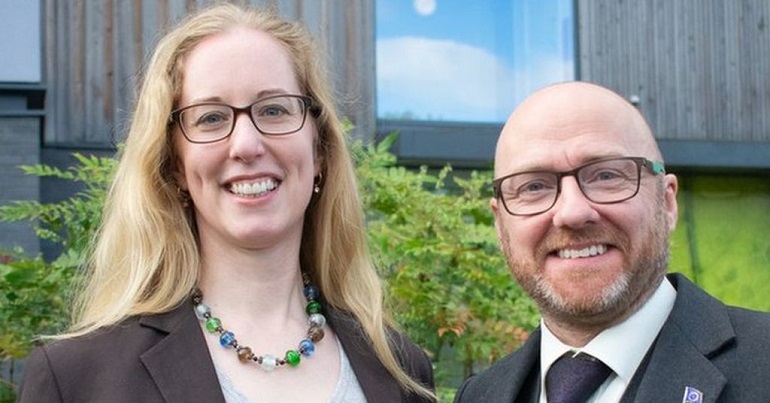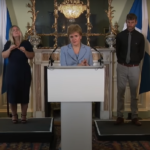The missing 10% and the independence of Yes Scotland
The phoney war is finally over. The independence campaign is in full swing. And as it gets going, there is a simple question for Yes Scotland: who are the 10%? Which 10% of people can be persuaded to switch to a yes vote? Answer this question, succeed in persuading most of them, and so long as none of the current supporters switch the other way, we’ve won.
In answering this question, the polling has been pretty consistent. The people who could bring the yes campaign a majority are those who most fear a future Tory at number ten. It’s those who are angry with Westminster and yearn for a country that leans more to the left; those who wish to save public services from austerity and hope for greater equality; those who side with the underdog and believe the future lies with the many, not the few; those who fear UKIP isolationism more than an internationalist independence; those who have least to lose and most to gain.
The rich and the right are voting no. That much, we already know. The whole ball game has to be that 10%: a mixture of people from the missing million, and left voters who can be persuaded to part ways with their party – Labour or Lib Dem – just this once.
I say all this because, of late, Alex Salmond has made a few comments which remind us that though he may sit to the left of Scottish Labour, that isn’t saying much. In particular, his fiscal policies leave much to be desired. And this is a real problem. Because, alongside foreign affairs, tax policy is the main lever he is arguing for.
The famous example is corporation tax – which he has consistently said he would cut. More recently, he told the New Statesman that he would only increase the top rate of income tax to 50p if Westminster did first. The White Paper proposes the abolition of air passenger duty: a tax paid overwhelmingly by the rich.
I am happy to argue until I’m blue in the face about why his economics are wrong. Flights take wealth away as much as they bring it with them. The climate change they will cause will certainly do little for our future economic prospects. Opposition to higher top rates or support for lower corporation tax only make sense if you think that wealth trickles down, rather than understanding that in fact is is hoovered up. But that’s for another day.
The problem for now is the taste that these accumulated policies leaves in the mouth of those who read about them. They give a very clear impression that, for all of their belief in public services, the SNP ultimately think that people are rich because they create wealth, rather than just because they accumulate it. It leaves an underlying impression that while they are happy to do left wing things that no one really objects to – like free education, they aren’t willing to stand up to the powerful when they need to.
And the problem with this is that it makes them look untrustworthy to the 10% identified above. It makes them feel like fair-weather friends.
Of course, I’m a Green member. So from a cynical perspective, the fact that the SNP look like a party which can’t be trusted to stand with the people against the powerful may be a good thing for us in the long term if you measure success in piles of ballot papers. But all of this presents a problem for the Yes campaign.
Because the 10% aren’t the most frequent flyers nor the payers of the upper tax rate nor those who benefit from low corporation tax. They are those who already have to pull in the slack for the wealthiest.
There is, of course, a simple get-out clause. Yes Scotland isn’t the SNP. If people vote yes, then they will have the chance to vote for whatever government they want. They can, if they choose, elect a government which won’t abolish air passenger duty and will increase the top rate of income tax. But this get out clause only works so long as Yes Scotland genuinely isn’t the SNP.
So, here’s my fear. When push came to shove over currency, the statements from Yes Scotland essentially repeated the position of the current Scottish government. This is despite the fact that two of the parties on the Yes Scotland advisory board – the Greens and the SSP – both support an independent currency. Now, of course, the SNP is much bigger than both the Greens and the SSP, and by far the biggest part of Yes’ coalition. But all that means is that they have their own press office, and are more than capable of articulating their own position.
A few months before the referendum, no one on the Yes side wants to fall out. And I have no interest in complaining about past statements about currency: water, bridges, and all that. But it is crucial, surely, that Yes Scotland doesn’t make this mistake again with corporation tax, or the 50p tax rate, or whatever else comes up next. Alex Salmond is welcome to his own brand of centrist politics, mixing in fiscal conservatism with universalist and liberal principles. It’s a mix which has got him a long way in politics, and which brought us this referendum in the first place.
But if we are going to win the referendum we need to put together a coalition that is even broader than that which won the SNP the 2011 election. And the evidence is that, while Salmond may sit in the centre of Scottish politics, the most likely winning coalition will consist almost entirely of people to his left.
In this context, if Yes Scotland just parrots the SNP line, then there is little point in its existence. The SNP are more than capable of doing their thing on their own, and they will bring their own coalition of voters to the ballot on the 18th of September. Yes Scotland’s role has to be to win everyone else – to secure the missing 10%. And thats made up of Labour voters, progressives with a history of backing the Lib Dems, Greens and socialists. This doesn’t mean that they should take particular policy positions. But it does mean they need to steer clear of backing up Salmond’s occasional neoliberal lurches.
If the Yes campaign becomes a parrot of the SNP, it may as well shut up shop. The SNP have got the whole being the SNP act pretty nailed down. Yes Scotland’s job is to reach the other 10%.




As an incomer to this country, but one who has been here 10 years and has a stake in Scotland’s future, as well as, dare I say, rUK future, I am concerned by the negative and divisive tone of the debate on both sides. One point that does not seem to be made is that while ostensibly, David Cameron does not want Scotland to go independent, he knows that, once he gets over the embarrassment of being the PM who lost Scotland, he can console himself in the knowledge that the Tories and other right wing parties are assured long term dominance of rUK politics. Is that what the left in Scotland really wants?
Who ever said the rich and the right are voting no? Wealthy Nation (http://www.wealthynation.org)and Scottish Democratic Alliance (http://scottishdemocraticalliance.org/) have quite a bit to say about what iScotland could look like by Yes Scotland HQ isn’t even trying to talk to them in their left only vision. Scottish politics does have a full spectrum. Don’t give up on the right half.
I think the central problem with the Left-Yes 10% appeal here is that it assumes a more vocally left voice won’t put off the neoliberal current supporters of Yes.